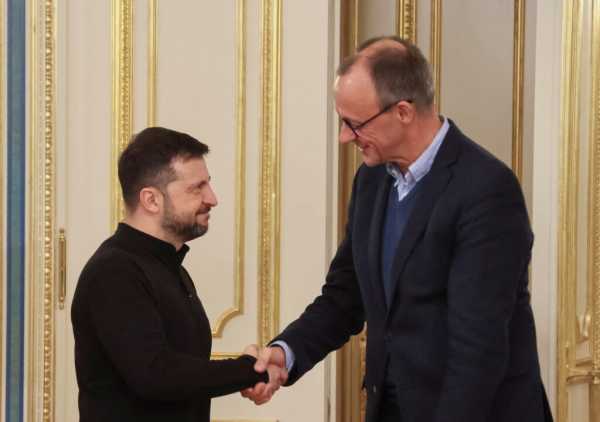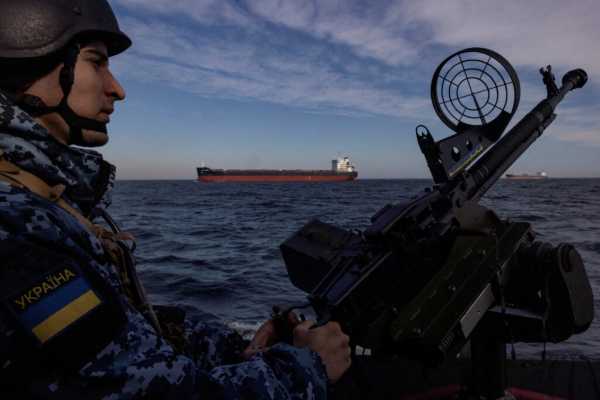
The collapse of Germany’s ruling coalition, which was formalized on Dec. 16 when Chancellor Olaf Scholz lost a no-confidence vote in the Bundestag, has been closely watched in Kyiv. The interest is understandable: Germany is one of Ukraine’s most important backers in Europe, and has provided more than €11 billion in military aid since Russia’s full-scale invasion nearly three years ago. That’s more than any other European country, and second only to the United States.
The next government in Berlin will face a number of challenges as it decides on Germany’s future support for Ukraine. However, there are signs that Kyiv and the wider transatlantic community may have reason to welcome early Bundestag elections scheduled for February 2025.
With the Christian Democratic Union (CDU) currently leading in national polls, CDU leader Friedrich Merz is expected to become the next chancellor. This is potentially good news for Ukraine. Merz is more hawkish on Russia than current German Chancellor Olaf Scholz. He is also poised to have a stronger majority in the Bundestag than Scholz, whose three-party coalition ultimately collapsed amid internal squabbles. For Ukraine, this will hopefully mean greater predictability in its bilateral relations with Berlin.
Before the official start of the German election campaign, Merz traveled to Kyiv in early December for meetings with the Ukrainian government. He is a vocal supporter of the supply of German Taurus cruise missiles to Ukraine, something Scholz has consistently refused to allow.
Scholz has also been criticized for a recent phone call to Vladimir Putin, which critics saw as a sign of Western disunity at a critical moment in diplomatic efforts to prepare for possible peace talks. Meanwhile, Scholz’s party has emphasized “peace” over security in its election messages, further widening the gap with the CDU, which is seen as taking a comparatively tougher stance on Russia.
The outlook from Ukraine’s perspective is not exactly bright. If Merz does win the election, he will face many of the same problems that his predecessor faced. These include Germany’s constitutional debt brake, which effectively limits the German government’s ability to spend more on defense without cutting spending elsewhere.
The CDU would have limited tools to secure funding for Ukraine. They could potentially reform the debt brake or try to cut public funding in other areas, such as social security and transport (which voters are unlikely to appreciate). Alternatively, they could replicate the approach taken by Scholz and try to pass another off-budget “special fund.” While not a long-term solution for Germany’s defense spending, a new special fund specifically for Ukraine could potentially gain enough political will in the Bundestag if managed correctly.
As Donald Trump's election victory heightens uncertainty about the future of US military support for Ukraine, finding solutions to preserve German aid should be high on the agenda of the new government in Berlin in early 2025. In addition to Trump's inevitable return to the White House, France is also stuck in a period of domestic political instability that could hamper French aid to Ukraine at a time when the Franco-German engine of Europe is needed more than ever.
Officials in Kyiv will be keen to avoid any developments in Germany that raise questions about the country’s continued support for Ukraine. Russian President Vladimir Putin is widely seen as counting on a possible weakening of Western resolve as he seeks to see democratic peace through to Ukraine. Any sign of disunity or uncertainty in Berlin could help convince Putin that time is on his side, further reducing the chances of meaningful peace talks.
Trump has promised to end the war and is expected to push for talks once he takes office in January. But with the Russian military advancing in eastern Ukraine amid growing signs of deteriorating Ukrainian morale and increasingly acute troop shortages, Putin will be in no rush to compromise. Unless the battlefield dynamics change significantly in the coming weeks, it may be difficult to persuade Putin to accept any peace terms that do not legitimize his invasion or represent a clear Russian victory.
There is a good chance that the snap elections in Germany will lead to a surge in support for Ukraine in Berlin. But the uncertainty of the next two months is an unwelcome problem, especially at a time when Kyiv is trying to send a message of Western unity to Moscow. As they face another winter of war, Ukrainians should wait to see who leads the new German government and how they formulate their plans.
Stuart Jones is a Program Assistant in the Atlantic Council's European Center. Catherine Spencer is a Program Assistant in the Atlantic Council's Eurasia Center.
Source: Source



